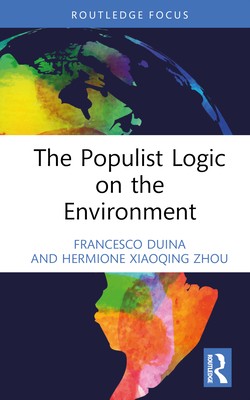
- We will send in 10–14 business days.
- Author: Francesco Duina
- Publisher: Routledge
- ISBN-10: 1032716649
- ISBN-13: 9781032716640
- Format: 14 x 21.6 x 0.6 cm, kieti viršeliai
- Language: English
- SAVE -10% with code: EXTRA
Reviews
Description
The Populist Logic on the Environment provides a framework that draws from populism's essence to explain and predict politicians' approaches to the environment.
Over the past few decades, populism has spread across the world - particularly in Europe, but also notably in the United States, South America, and Asia. There are considerable variations across populists in their environmental stances. This holds across the political spectrum from left to right, regardless of the traditional tendency of right-wing parties to be skeptical of pro-environmental positions and of left-wing parties to subscribe to them. Regardless of variations, however, 'true populists' can be expected to consistently anchor environmental stances in people-centrism and anti-elitism - in ways linked to additional party-specific factors. This book systematizes analytically what the literature observes, corrects some of its empirical limitations, and allows for reflection on the commitment by any one populist party to the environment. The authors undertake a cross-regional analysis of four case studies to illustrate their position: Marine Le Pen's National Rally in France, the US Republican Party led by Donald Trump, Spain's Podemos led by Pablo Iglesias, and Hugo Chávez and Nicolás Maduro's socialist regime in Venezuela.
This book will appeal to scholars and students of political science, public policy, environmental studies, sociology, and geography, as well as a general audience interested in populism and the environment.
EXTRA 10 % discount with code: EXTRA
The promotion ends in 22d.23:36:31
The discount code is valid when purchasing from 10 €. Discounts do not stack.
- Author: Francesco Duina
- Publisher: Routledge
- ISBN-10: 1032716649
- ISBN-13: 9781032716640
- Format: 14 x 21.6 x 0.6 cm, kieti viršeliai
- Language: English English
The Populist Logic on the Environment provides a framework that draws from populism's essence to explain and predict politicians' approaches to the environment.
Over the past few decades, populism has spread across the world - particularly in Europe, but also notably in the United States, South America, and Asia. There are considerable variations across populists in their environmental stances. This holds across the political spectrum from left to right, regardless of the traditional tendency of right-wing parties to be skeptical of pro-environmental positions and of left-wing parties to subscribe to them. Regardless of variations, however, 'true populists' can be expected to consistently anchor environmental stances in people-centrism and anti-elitism - in ways linked to additional party-specific factors. This book systematizes analytically what the literature observes, corrects some of its empirical limitations, and allows for reflection on the commitment by any one populist party to the environment. The authors undertake a cross-regional analysis of four case studies to illustrate their position: Marine Le Pen's National Rally in France, the US Republican Party led by Donald Trump, Spain's Podemos led by Pablo Iglesias, and Hugo Chávez and Nicolás Maduro's socialist regime in Venezuela.
This book will appeal to scholars and students of political science, public policy, environmental studies, sociology, and geography, as well as a general audience interested in populism and the environment.


Reviews